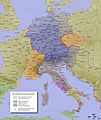Germans facts for kids
| Total population | |
|---|---|
| c. 100–150 worldwide | |
| Regions with significant populations | |
| 62,482,000 | |
| 46,047,114 (descent) | |
| 12,000,000 (descent) | |
| 3,541,600 (descent) | |
| 3,322,405 (descent) | |
| 500,000 (descent) | |
| 437,000 | |
| 394,138 | |
| 368,512 | |
| 310,900 | |
| 204,000 | |
| 181,958 | |
| 178,837 | |
| 148,000 | |
| 167.771 | |
| 50,863 | |
| 15,000–40,000 | |
| 40,000 | |
| 36,000 | |
| 33,302 | |
| 27,593 | |
| 25,000 | |
| 21,216 | |
| 10,030 (2016) | |
| Languages | |
| German | |
| Religion | |
| Historically: 2/3rds Protestant 1/3rd Roman Catholic Nowadays: 1/3rd Protestant 1/3rd Roman Catholic 1/3rd Irreligious |
|
| Related ethnic groups | |
| other Germanic peoples | |
Germans (German: Deutsche) are a group of people who mostly live in Central Europe. They are known for sharing a common culture, history, and the German tongue. Most Germans speak German as their first language.
The word Germans has been used for a long time. It used to describe people who spoke German in the Holy Roman Empire. This was a large empire that existed for many centuries.
Contents
Who are the Germans?
About 100 million people around the world speak German as their native language. Out of these, about 80 million consider themselves to be Germans.
Where do Germans live?
Many people of German background live outside of Germany. This includes about 80 million people who have German ancestors. They mainly live in countries like the United States, Brazil, Argentina, and Canada. You can also find many people of German descent in South Africa, Russia, and Kazakhstan.
So, the total number of people who are German or have German roots is between 100 and 150 million. This number changes depending on how you count them. For example, some counts include only native German speakers, while others include people with some German family history.
German Identity Today
Today, people from countries where German is spoken, like Austria, Switzerland, Liechtenstein, and Luxembourg, usually see themselves as citizens of their own countries. They might or might not also identify as ethnically German. These countries were once part of the old Holy Roman Empire.
History and Religion
For a long time, German society has been divided by religion. This started with the Protestant Reformation. This was a big religious movement that began in the Holy Roman Empire. It led to many people becoming Protestant instead of Catholic.
Historically, about two-thirds of Germans were Protestant and one-third were Catholic. Nowadays, the numbers are a bit different. About one-third are Protestant, one-third are Catholic, and one-third do not follow a religion.
Images for kids
-
Extent of Holy Roman Empire in 972 (red line) and 1035 (red dots) with Kingdom of Germany marked in blue
-
Germans expelled from Poland in 1948.
See also
 In Spanish: Pueblo alemán para niños
In Spanish: Pueblo alemán para niños





